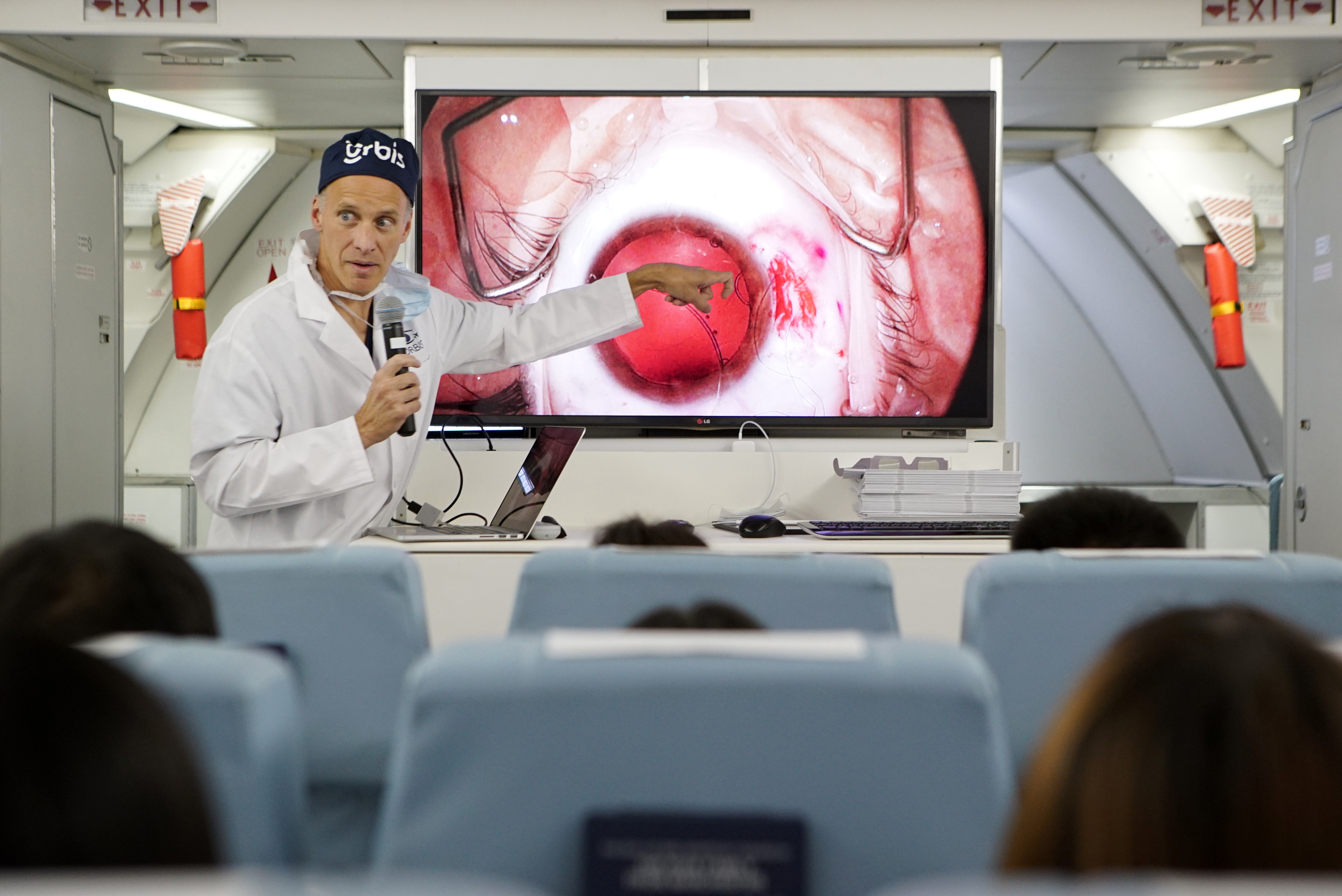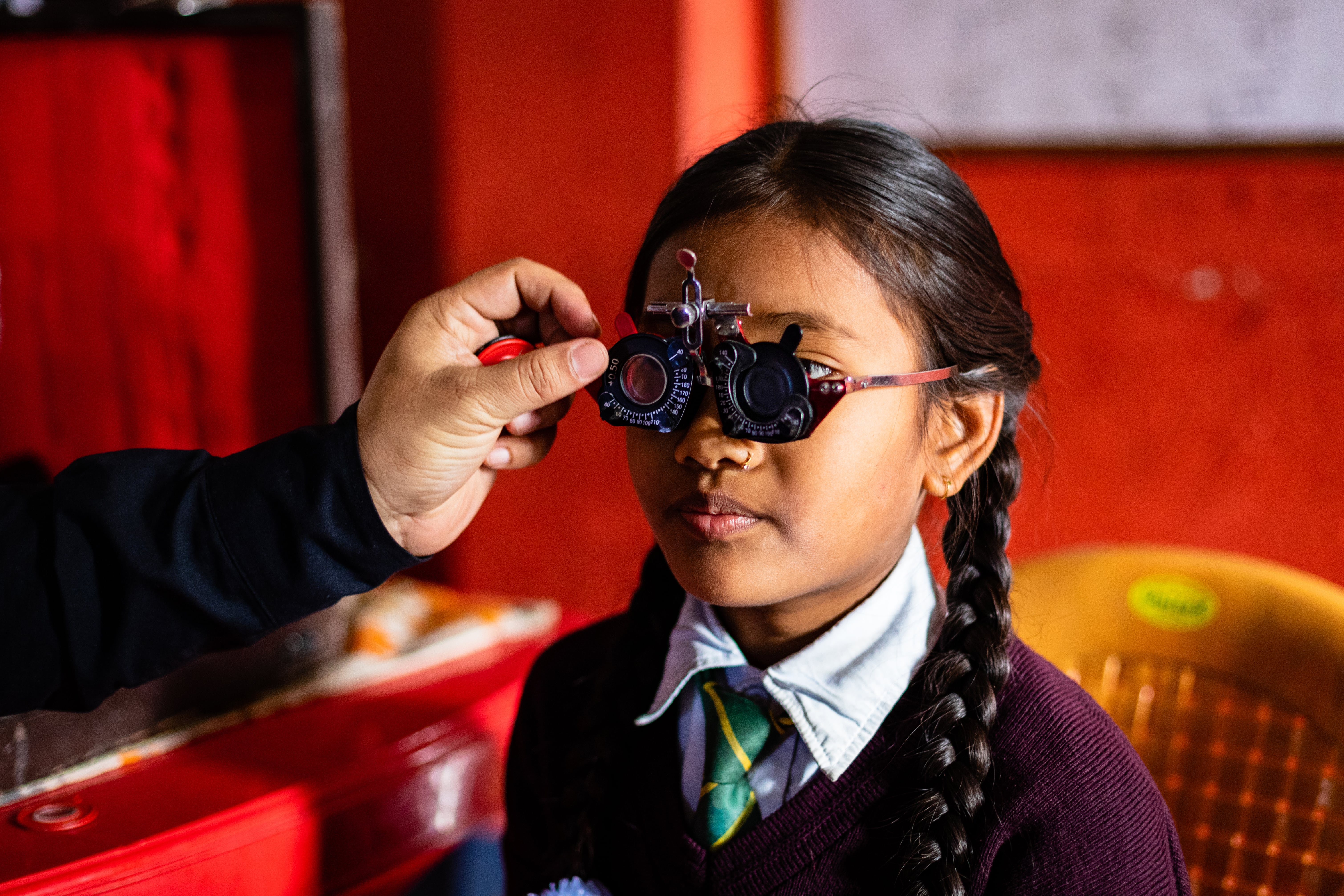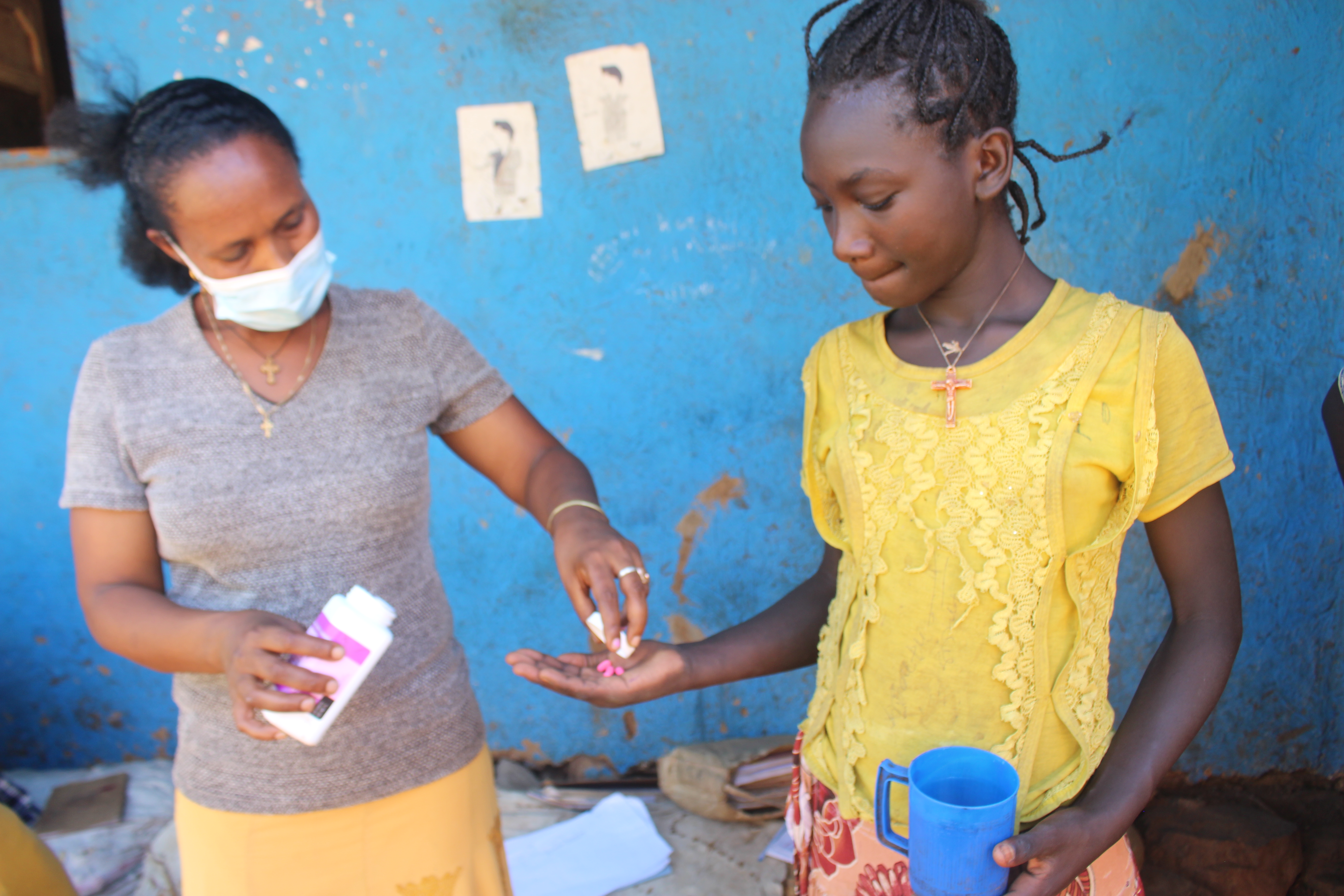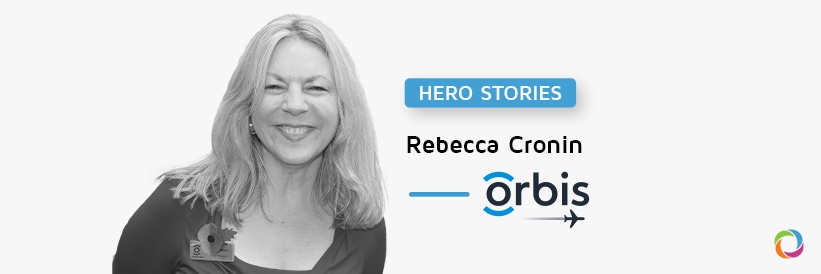An inspiring woman willing to bring change to people’s lives, a fully involved professional able to find partners in life transforming processes, a passionate team player ready to pull her weight for the greater good, meet Rebecca Cronin, the CEO of Orbis UK in the latest edition of “Hero Stories”. Find out how she has succeeded in stimulating fundraising and investments in the eye care sector, what the ‘Flying Eye Hospital is, and why the restoration of sight is one of the most effective and cost-efficient ways of reversing the cycle of poverty.
DevelopmentAid: Rebecca, let’s start our conversation by finding out the reasons behind your decision to follow the path of a career in development. How did you end up in the eye health sector?
Rebecca Cronin: I grew up in Tanzania in East Africa where I spent quite a lot of time until I came back to England when I was about 11. From a young age, I witnessed the health inequalities that people faced and remember many of them had disabilities and no support or access to a health care infrastructure. I think that somewhere along the line that made an impression on me. I always wanted to do something that would address that inequality when I was old enough. I think that’s why I ended up embracing the development sector. Let’s take cataracts, for instance, it takes a very simple procedure to get rid of these and avoid blindness. It just really shows you how something so simple can just make all the difference. Simple things can be life-transforming. Orbis is doing such amazing work.
DevelopmentAid: You are in the role and have gained proper resources to bring transformative changes. How are you facilitating people’s access to eye health infrastructure?
Rebecca Cronin: This is one of the things Orbis is really focused on. We very much work in the regions where people don’t have access or have limited access to eye care. It’s all about the ability to train, mentor, and provide the tools an eye care professional needs in the places of greatest needs. Ethiopia, Zambia, Bangladesh, India, and Rwanda are some of the destinations our team have been working in. It’s been 40 years since the Flying Eye Hospital first flew and did its first trip.

DevelopmentAid: The Flying Eye Hospital is an innovative tool to this very day. How does real magic happen on board?
Rebecca Cronin: David Paton, an American ophthalmologist who laid the foundation for Orbis back in the late 1970s, had this quite ingenious idea to use an airplane to take professionals and proper tools to low and middle-income countries where people don’t have enough access to continuing medical education. This is how the Orbis Flying Eye Hospital, the world’s only ophthalmic teaching hospital onboard an MD-10 aircraft, came into being. Since 1982, this initiative has allowed the transfer of skills to medical professionals to ensure local communities are not hindered by avoidable vision loss. It’s incredible, when you go in, where normally there should be the passenger seats, you find a fully equipped training centre. A huge TV screen in the classroom at the front of the plane is linked to the surgery which is in the middle of the aircraft. Programme participants can watch a live feed from the surgery with the volunteer surgeons explaining the process. They can talk to the surgeons backwards and forward asking questions and exchanging all the details. On many occasions, I have watched surgeries myself. The recovery room is at the back of the plane and the patients spend time there recovering. Anywhere from 75 to over 100 treatments can be delivered throughout a Flying Eye Hospital program in a single visit, both onboard the plane and within the local partner hospital. Now it has travelled to almost 80 countries during its 40 years of operation.
It’s all about transferring those skills in a particular country.
DevelopmentAid: Along with your team, you are working on strengthening existing services by establishing long-term country programs and delivering training to all types of employees across all levels of the health system. What are Orbis’ priorities in this specific area?
Rebecca Cronin: In the beginning, we concentrated on surgeons but now we are more and more interested in training the whole team: ophthalmologists, anaesthetists, nurses, and bio-medical engineers. For example, the Flying Eye Hospital hosts two to three-week programs tailored specifically to the location’s needs. Surgery and training are conducted both on board and at the local partner hospital. It’s all about transferring those skills in a particular country. Relying on the support of our medical volunteers, the local specialists can tackle more complicated patient cases and receive continued support through Orbis’ Cybersight (a platform for learning and the sharing of practice). However, the Flying Eye Hospital is just one area of our work. Through our long-term country programs, we support our partners day to day to strengthen referral pathways, improve eye care services, train personnel- from medical professionals through to community eye health volunteers and teachers – and increase awareness, so that those who need support for their vision loss have a place to access it. Despite the pandemic, Orbis UK supporters enabled us to work with our partners to deliver over 8.1 million treatments in 2021 (including surgeries and antibiotics) and training sessions.

DevelopmentAid: How do you ensure the sustainability of your interventions?
Rebecca Cronin: There is one British ophthalmologist, Larry Benjamin, who often goes out on Orbis training missions. Larry has been training and monitoring an ophthalmologist in Zambia to do paediatric surgery. At a certain point, he just said: “I don’t need to go again. He is such an excellent surgeon, he doesn’t need any more interventions or support, he can now train his colleagues in Zambia.” This particular doctor is now training his own colleagues. That is such an amazing feeling. Zambia has very few paediatric ophthalmologists. Now children from that community have somebody to take care of them who is fully equipped to do so.
A small intervention can have impact not only on an individual, but on a whole community.
DevelopmentAid: The restoration of sight is one of the most effective and cost-efficient ways to reverse the cycle of poverty for individuals and their families according to the World Bank and the World Health Organisation. How do you explain this?
Rebecca Cronin: Every British pound spent on eye care represents a £4 return on investments. I need glasses otherwise I can’t do close work. Sometimes the solution is so simple, to provide women with a pair of glasses, they can continue to do close work, their earnings can go up and they can work for much longer. A small intervention can make a real difference to somebody’s life. One of the people who has been volunteering for Orbis for years removed the cataracts of a young man during one of his volunteer assignments with us. Once he had the surgery, he could begin to fix all the shoes in the village and support his family. A small intervention can have impact not only on an individual, but on a whole community. That’s why we talk about the economic impact and how a small intervention can make a really big difference.

Around 112 million more women than men live with vision disorders.
DevelopmentAid: Are some of Orbis’ interventions focused predominantly on reaching women and girls as sight loss affects more women than men? It’s also known that women face more barriers in ways to seek eye care.
Rebecca Cronin: Women are often unable to go and get eye surgery. The services are too far away from them to get to and perhaps in some cases these are expensive. The obstacles are related to difficulties in accessing finance, the inability to travel, access to education, and sometimes they need a chaperone to travel with. Around 112 million more women than men live with vision disorders. Our colleagues in Bangladesh are working on the development of women led vision centres to encourage people to access available services.
DevelopmentAid: Trachoma, a terrible infection causing blindness unless treated properly, affects many more women than men (70%). Recently, Orbis, in partnership with The Qatar Fund for Development, launched a new initiative in Ethiopia aimed at delivering crucial programs and services to address this infection. Can you tell us more about this?
Rebecca Cronin: We work with health workers in various rural districts, and they are often women, to encourage them, in particular, to speak to other women, to explain the issues related to trachoma, to encourage handwashing and face washing, and, if they do have trachoma, to get the interventions they need. We have several initiatives where we try to encourage women, to educate them that these services exist, and encourage them to use them. Nobody has to be excluded, but where we have gender imbalance, we try to address it. My Ethiopian colleagues work along with the Ministry of Health and make sure they have the funding and the resources to continue dealing with the trachoma condition. We intend to deliver over 300,000 services, including screenings, distributing antibiotics, providing spectacles, and conducting surgery to communities following the WHO SAFE Strategy thanks to the Qatar Fund for Development’s support.

Our donors are committed to making a difference.
DevelopmentAid: From 2015 – 2019, under your leadership, Orbis’ fundraising increased by 80%! How did you succeed in stimulating people’s interest in supporting your work?
Rebecca Cronin: We have amazing supporters. People who give us money are so generous and committed to making a difference. It is so much about teamwork. Even while we are talking right now, I am thinking about Orbis projects.
DevelopmentAid: How do you develop your narrative in order to achieve these results?
Rebecca Cronin: It’s about the economic arguments. Why investing in providing eye care makes a significant difference financially. I think it’s using those arguments. If you get the right team and resources, you could have such a beneficial effect. Look at how our ophthalmologist, Larry Benjamin, impacted the doctor and his community in Zambia. There is a long-term ripple effect when it comes to investing in training. Those arguments are quite simple and easy to convey. Often people have had their own eye problems, you can help people see, there is the simplicity of it, the transformational approach. We also have different interesting campaigns. One of our donors gives a very generous donation – let’s say £100,000 – but they want that to be matched by other donors. Well, until another donor or several donors donate £100,000, they won’t make this donation. And people find that quite inspiring in terms of they want to unlock that £200,000 pounds. It is an innovative way to raise money.
DevelopmentAid: What are your next moves?
Rebecca Cronin: To see if we can raise money and motivate existing supporters. We might find different strategies to increase their giving. I have some brilliant colleagues who work so hard on cultivating the relationships. It’s all about relationships, the ability to tell the stories I am telling you, so people can understand the impact the donations have. I am very excited about this new strategy we have developed along with the President and the CEO of Orbis in New York. This strategy will be for the next five years and defines how we can work together as a global team to a have greater impact. This work is bringing people together with a very clear idea of where we are going to expend our energy. So, these sorts of things are very inspirational.

